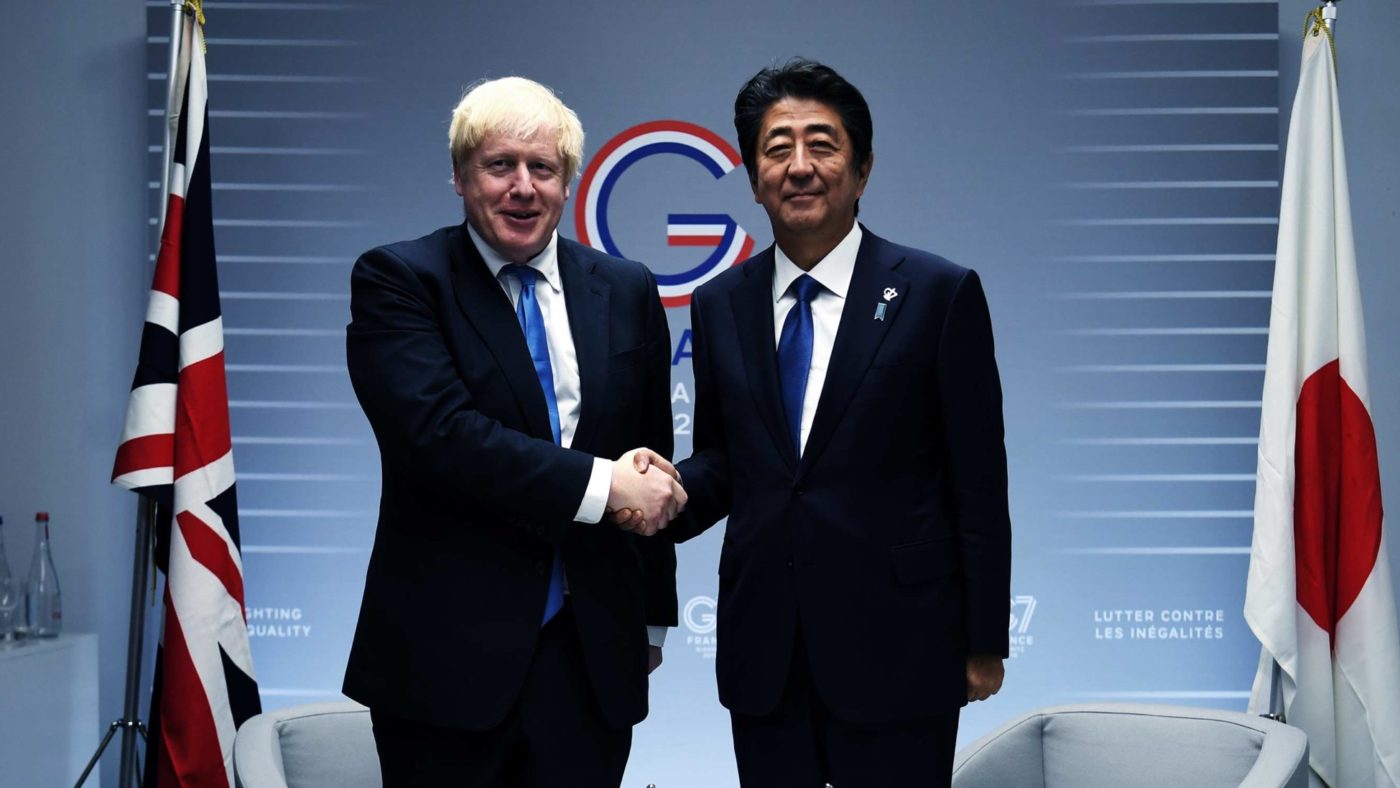A lot changed in British politics on December 12. One thing that didn’t was the tendency to draw misleading comparisons between Boris Johnson and foreign leaders. The most common, and arguably the silliest, is the idea that Johnson is “the British Trump” — a claim made by the President himself and peddled by Jeremy Corbyn (to little effect) ahead of last month’s election. Others seek to lump the Prime Minister in with the continent’s right-wing populists such as Viktor Orban and Matteo Salvini. Notwithstanding one of his advisers’ freelancing in Budapest this month, this is not a crowd that a metropolitan Tory like Johnson would feel especially comfortable in.
But in spite of these unhelpful parallels, there really is some merit in looking overseas to understand the new landscape that British politics is in. One intriguing and potentially illuminating comparison is with Johnson’s Japanese counterpart, Shinzo Abe.
Abe, like Johnson, is a centre-right leader sometimes lumped in with the populists; Steve Bannon once called him “Trump before Trump”. As with Johnson, this misses the point.
Unlike many of those they are compared to, neither Johnson nor Abe are outsiders. Johnson’s CV is hardly unusual for a Conservative prime minister, while Abe hails from Japan’s political upper crust. But while Johnson and Abe might not be out-and-out populists, they are hardly straightforwardly establishment either. Both strike a patriotic, even nationalistic, tone; Johnson in his bulldoggish confidence that Britain can rise to the challenge of Brexit, Abe in his desire to shrug off his country’s humility about 20th century history.
In 2016, Johnson delivered an electoral earthquake with a promise to “take back control”. Four years earlier, Abe won power with the slogan “take back Japan”. Both have put the prospect of an unshackled country at the heart of their political projects: Britain’s departure from the EU in and an overhaul of the pacifist constitution written for Japan by the Allies in 1945.
Both have taken steps to deliver those promises that critics see as corner-cutting. Johnson’s prorogation of Parliament echos some of the ways in which Abe delivered his constitutional reforms. But even as the two leaders face charges of eroding norms or representing threats to democracy in much the same way as Trump, they are engaged in fundamentally different projects to that of the US president. Rather than seeking disruption for the sake of it, they are driven by a more patrician sensibility, folding populist ingredients into a conservative offering. Such an approach plots a course between foolhardy radicalism and destabilising inertia.
The nationalistic pose struck by Abe has not meant a parochial approach to global issues.
Abe has been an advocate for trade liberalisation and economic openness in the Trump era, touting the Trans-Pacific Partnership as the great hope for free trade. Johnson and many of those around him hope to use Brexit to do something similar, returning Britain to its role as a global champion of free trade. (Whether they live up to their own hype remains to be seen.)
There are also similarites in the way both men rose to the top. Abe’s second stint as Prime Minister (he briefly occupied the role in 2006-07) came at the end of a period of intense political turbulence. Japan had three Prime Ministers in the three years before he took office in 2012. Johnson may have had an uncomfortable first six months in office, but armed with a majority he is likely to oversee a period of comparative quiet compared to the preceding few years.
On policy, Johnson is set to embark on his own version of Abenomics, the mixture of fiscal stimulus, loose monetary policy and structural reform that the Japanese Prime Minister has in some ways pioneered. If this government delivers on its promise of bold domestic policymaking and Britain gets a dose of “Johnsonomics”, it will differ substantively from Abe’s reforms, but it will similarly represent an overhaul of centre-right thinking designed to combat the country’s longstanding problems — meagre productivity growth and massive regional inequality.
Abe’s substantive policy platform came with a civil service shake up of the sort whispered about in Whitehall. (Though the Japanese Prime Minister does not appear to have issued a Dominic Cummings-style call for freaks and weirdos.)
Given these striking similarities, what lessons might Abe’s eight years (and counting) in office hold for Johnson? Perhaps that his administration is less likely to end in either glorious triumph or tears than his cheerleaders and detractors respectively tend to predict. If the mixed results— and reception — of Abe’s reforms are anything to go by, then judgment on Brexit and the government that delivered it will be ambiguous. Abe has not dealt a decisive blow to the problems that plague Japan, but he has made undeniable progress and avoided disaster. The easiest imaginable version of the next few years in British politics looks similar.
The one thing that Abe’s mix of watered-down populism and policy reform do appear to be well-suited to is survival. As of November, Abe is the longest serving Prime Minister in the history of Japan’s constitutional government. Surveying a political landscape that includes a devastated opposition party, a sizeable Commons majority and the prospect of at least five years in which to deliver on the promises he has made to the country, Johnson may conclude that staying power is another characteristic that he shares with the Japanese leader.
Click here to subscribe to our daily briefing – the best pieces from CapX and across the web.
CapX depends on the generosity of its readers. If you value what we do, please consider making a donation.


